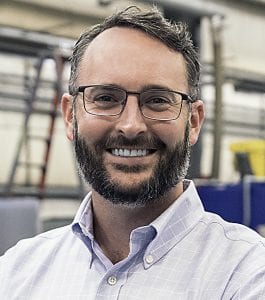
What’s a typical day like for you at Wisconsin Oven?
My typical day is quite a bit of fun. I’ve got three kids, and it’s important for me to be present and involved as much as possible. Every morning I try to make breakfast before heading into the office. It’s a really good way to start the day no matter what’s ahead for me within the workday.
When I come in, it’s a combination of calls and meetings with the various business leaders and employees across TPS. With TPS having four manufacturing locations and multiple brands within them, it’s critical to have an open line of communication. I stepped in as the CEO in the summer of 2019, so from that point to today, it was really a time where we spent a lot of time collectively thinking about the brands, locations, and the paths forward making sure everyone has a clear picture on where we’re going as an organization.
Obviously, it’s an ongoing process, but I’m happy with the progress the team has made. At the end of the day, I get to work with a lot of great people that take tremendous pride in what they do, so it’s pretty easy to come into work every day.
Although my primary office is at the Wisconsin Oven location in East Troy, Wisconsin, I travel frequently to the other TPS locations in Pennsylvania, Michigan, and California.
What is Wisconsin Oven doing to adapt to this Industrial Internet of Things?
We’ve obviously seen the trajectory of the Industrial Internet of Things and Industry 4.0. Wisconsin Oven has been able to engage with our customers and collectively get feedback regarding the benefits of IIoT. Ultimately, we see that the demands can be different from customer to customer, so we spent time working with customers to better understand their perspective. Even though we’re still in the developmental and testing stages, the progress on the initiative has been incredible. We’re looking to provide the market with an offering that gives customers comfort that their equipment is going to perform optimally and ensure uptime throughout its life cycle.
What is Wisconsin Oven doing to enable its ovens to support the Industrial Internet of Things?
Currently, there are a number of sensors on the equipment. What’s going to differentiate what is on the equipment now to what we’re going to provide is the additional sensors, the frequency of data collection, the retention of data, and the ability to monitor the data within a cloud solution. We understand that customers are rightfully sensitive to data security, so in addition to a cloud solution, we will also provide the ability to collect the data and not transfer it without direct interaction.
Ultimately, these pieces of equipment can be installed for 20 to 30 years. And just with any piece of capital equipment, over time, it needs maintenance. Maybe it’s been done over the course of time and maybe it hasn’t, but we want to make sure the customer is still able to meet their manufacturing needs. The ability to track data within set criteria is critical to that. We can set alerts to variances that may occur, thus enabling a pre-emptive response that can save a customer from un-warranted downtime.
By having sensors that can upload alerts to the cloud, is this the next step into preventive maintenance?
I think it’s a very, very significant step. Again, the ability to see any variance in performance of key items such as temperature, uniformity, pressure, and vibration may be an indication that there is a deviation from peak performance. Being able to identify that as quickly as possible is critical.
Will this involve any special training, and will it actually make processes easier to understand, monitor, and control?
We’re not expecting that any significant training should be needed. We’re looking to make things easier and faster than historical approaches. We’ve identified a very simple and intuitive interface that has garnered positive feedback.
What kind of plans does Wisconsin Oven have to help retrofit older ovens?
Wisconsin Oven is absolutely looking to provide a solution that may be added to equipment that is already in the field. Obtaining the data on a new oven is critical, but just as critical is the ability to connect and collect this information on older ovens. Again, thinking about these pieces of equipment over time, the faster we’re able to identify any variance in performance, the better.
MORE INFO www.wisoven.com
























